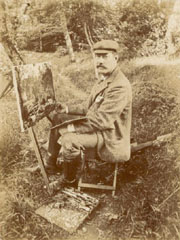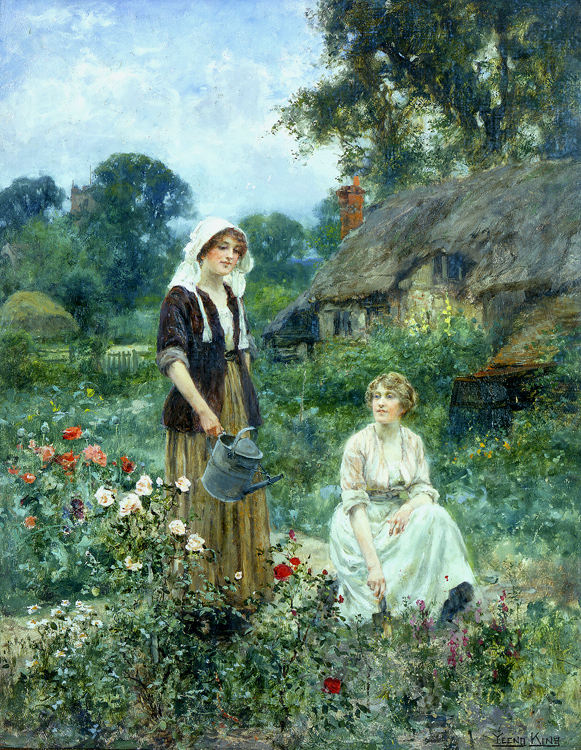Henry John Yeend King
(1855 - 1924)
Watering the Roses
Oil on canvas
28 x 22 inches
Signed
BIOGRAPHY - Henry John Yeend King (1855 - 1924)

Henry John Yeend King was an important Victorian genre and landscape artist. He was born in London on August 21, 1855 and began his education as a choirboy at the Temple Church. One of the artist’s earliest recollections was of being locked in the building one afternoon after practice: “I had to spend the night in a cabin built of pew cushions, while my father was inquiring at every hospital in London. After three weeks’ rest with a bad cold, on going back to my choral duties I was summoned to an interview with a Bencher, who, after regaling me with cake and wine, presented me with five shillings for having been a ‘good boy,’ and ‘for not having thrown my boots through one of the stained-glass windows.’ The idea of doing such a thing had never occurred to me.”
He continued his schooling at the Philological School before being apprenticed to O'Connor's, the glass painters, of Bernes St., London for three years. After working at O'Connor's he went to study painting under the Victorian artist William Bromley, RBA, and then he traveled to Paris to study under Leon Bonnat (1833 - 1922) and Fernand Cormon (1854 - 1924). His academic training in Paris, along with a definite influence of the French Realists and Impressionists, helped mold his fully matured style of carefully modeled figures, plein air technique and bold coloration.
Yeend King lived in London for most of his life however, like many of his contemporaries his heart was 'in the country'. He traveled extensively throughout England and France in search of suitable subject matter. In 1885 he wrote and illustrated an article entitled “A Round in France” for The Magazine of Art - giving both a visual and written tour of the French countryside leading to Brittany.
His specialty was scenes of rustic genre and the countryside; almost never showing the heavily industrialized cities. His paintings depict pretty farm girls (often using his own daughter as a model) at work in the fields or on the farm ? much like the French Realist artist Julien Dupré; or women at rest in tranquil landscapes or cottage gardens.
In 1881 he married Edith Lilian Atkinson, daughter of T.L. Atkinson (the mezzotint engraver), and they had one daughter - Lilian (who became an artist).
In 1879, he was elected to the Royal Society of British Artist (RBA) and in 1886 was elected to the Royal Institute of Painters in Watercolor (of which he later became vice-president). He was also a member of the Royal Institute of Painters in Oil Colors and was a frequent exhibitor at all the major exhibition halls; showing 115 works at the RBA, 38 at the RI and 94 at the Royal Academy. Yeend King also exhibited paintings throughout Europe and the United States; winning medals in Paris, Berlin and Chicago.
The editor of The Magazine of Art made the following comments about his painting entitled Loiterers that was displayed at the Exhibition of British Artists in 1883:
Mr. Yeend King’s “Loiterers” – two young girls among the sand hills on the shore of a summer sea under a sultry sky, with the sense of glowing heat and lassitude rendered with power and breadth.
It was at the Royal Academy exhibit of 1897 that the Council of the RA, as trustees for the permanent collection in New South Wales, purchased The Garden by the River and in 1898 the Tate Gallery, under the Chantrey Bequest, purchased Milking Time.
Yeend King was an important and influential artist and was noted by the London Times in an article on June 6, 1924 as:
In appearance Yeend King was a contrast to the conventional idea of an artist, being clean shaven, wearing his hair short, and having a genial smile and a great fund of humor. Like most painters, however, he was a real Bohemian, with a wonderful collection of funny stories, which he told well. He was seldom without a snuff-box, although he himself was not a constant snuff-taker.
He died in June 1924 at the age of 68.
Selected Museums
From Green to Gold (c.1889) - Walker Art Gallery, Liverpool
Landscape with a Windmill - Leicestershire Museums & Art Galleries, UK
River Banks and Blossoms (1909) – Rochdale Art Gallery, England
A Cottage Garden, Braemar – Stockport Art Gallery, England
The Woodyard – Leeds City Art Galleries, England
Landscape – City Art Gallery, Manchester
Lathkill Dale, Derbyshire – Graves Art Gallery, England
Milking Time – Tate Gallery, England
Girls Herding Geese – Oldham Art Gallery, England
The Millstream - Oldham Art Gallery, England

